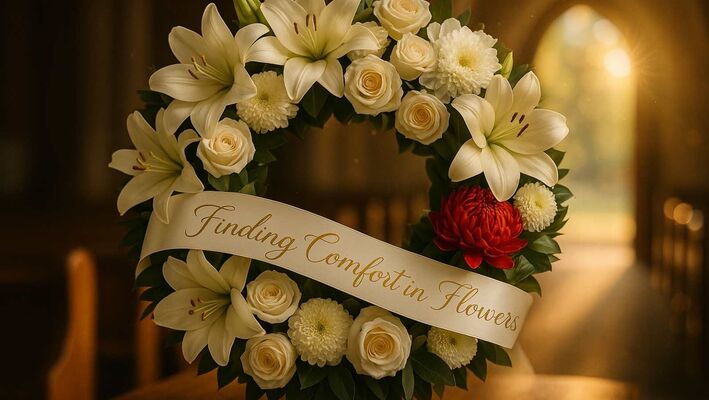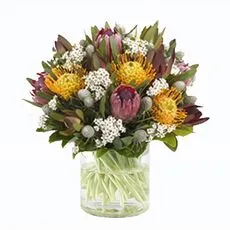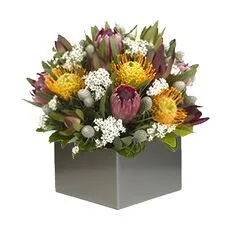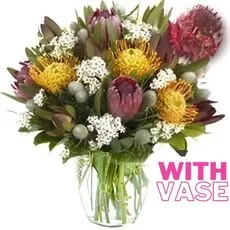Same Day Flowers Delivery - Australia Wide!
What Kind of Flowers Should You Send to a Funeral in Australia?

Losing a loved one or friend is a rough experience for all. During times of loss, sending flowers is a common thing to do in Australia for it's a way to express your sympathy, offer comfort to people who have lost a loved one, and acknowledge the memory of the deceased.
Funeral flowers carry meanings that words tend not to at times, they are great for conveying love, for showing respect, and support to family and friends when it’s needed most. This compassionate guide by the the team and I at Lily's Florist will walk you through the flowers commonly sent by us for funerals right across Australia, the types of flower arrangements used (wreaths, sprays, sheafs, and more).
Common Funeral Flowers and Their Meanings

Certain flowers have become traditional for funerals in Australia. They are chosen not only for their beauty, but for the heartfelt messages they embody. Below are some of the most popular funeral flowers and what they commonly signify:
Lilies
Often considered the go-to funeral flower. White lilies in particular symbolise the restored innocence of the soul of the deceased. Their presence at a service invokes purity, peace, and the spiritual significance of a loved one's soul at rest.
Roses
A classic symbol of love and respect. Different colours carry different meanings – for instance, red roses express deep love and grief, while white roses signify reverence, purity, and innocence. Yellow roses can represent friendship and are sometimes sent to honour a close friend.
Chrysanthemums
Commonly seen in Australian funeral wreaths and sprays, chrysanthemums (often white) represent sympathy and honor. In many European cultures, chrysanthemums are used exclusively for funerals and memorials, and in several Asian cultures they symbolise grief and sorrow. This makes them a particularly appropriate choice to express condolences across various traditions.
Carnations
These hardy flowers are frequently used in funeral arrangements and wreaths. They not only last long but also carry meaning: white carnations symbolise pure love and innocence, while pink carnations are often associated with remembrance and a mother's undying love. Red carnations, on the other hand, express admiration for the person who has passed.
Orchids
A single orchid or an arrangement of orchids conveys eternal love and elegance. Orchids are a beautiful way to express that "I will always love you," and they last longer than many cut flowers, which means the tribute endures. White and pink orchids are commonly given as sympathy flowers, representing everlasting affection.
Australian Native Flowers
Many people choose to incorporate Australian native flowers (such as waratahs, banksias, or gum blossoms) into funeral arrangements. Natives can reflect the natural beauty of the local environment and symbolise strength, resilience, and the unique spirit of the departed. Including native blooms can be a touching way to personalise a tribute, especially if the person had a love of nature or a proud Australian identity.
Others
Gladioli (tall, elegant spikes of flowers) are often used in fan sprays, conveying strength of character and moral integrity. Gerberas can add a gentle touch of colour – these daisy-like flowers symbolise innocence and purity and can celebrate the joy the person brought to others. Tulips and irises sometimes appear in arrangements as well, representing love and hope. Ultimately, if the deceased had a favourite flower or colour, incorporating that can be the most meaningful choice of all, regardless of tradition.
Common Funeral Flower Arrangements
Not only do the types of flowers matter, but how they are arranged plays a role in their presentation and purpose. Funeral flower arrangements in Australia typically fall into a few key types, each suited to a different purpose at the service or graveside.
Wreaths

Floral wreaths are circular arrangements of flowers and foliage, traditionally symbolising eternal life and continuity. The ring shape (with neither beginning nor end) stands for the everlasting love and remembrance that endures beyond death. Wreaths are often displayed prominently at the funeral service or laid at the gravesite. They can be sent by relatives, friends, or colleagues as a public show of respect. Many funeral wreaths feature white lilies, roses or chrysanthemums, though they can be made in any colour scheme to honour the individual.
Sprays
"Sprays" refer to large arrangements meant to be displayed on an easel or atop the casket. There are two main kinds of sprays:
Casket Sprays

These are lush arrangements designed to lay flat on top of the coffin. Usually chosen by the immediate family, casket sprays act as a beautiful centrepiece for the service, often incorporating the deceased's favourite flowers or colours. They typically cover a significant portion of the casket and are a touching final tribute from close loved ones.
Standing Sprays (Tributes)

These tall arrangements are affixed to a stand or easel and placed around the casket or at the front of the ceremony. Standing sprays can be in the form of traditional sprays (a fan or teardrop shape of flowers), or special shapes such as crosses (reflecting faith and remembrance) or hearts (symbolising love and loss). They are often sent by extended family, friends, or groups (for example, coworkers might chip in for a large standing spray) to visibly show support and sympathy. Standing sprays add visual tribute to the service and can later be moved graveside or to a reception area.
Sheafs (Tied Sheaf Bouquets)

A sheaf is essentially a bouquet of flowers arranged in a flat, fan-shaped style and tied together, intended to lie flat rather than sit upright in a vase. Sheaf bouquets are meant to be laid on the coffin or grave, or handed to the family as a sign of condolence. They are a simple yet elegant option – often more affordable – and suitable for any mourner to give. A tied sheaf is a beautifully arranged bunch of flowers tied together so that they can lay flat on the coffin or the ground. This makes it an ideal choice if you want something less formal than a wreath or spray, but still respectful and easy for the family to later take home or leave at the gravesite.
Posies and Bouquets
Smaller arrangements, such as round posy arrangements or hand-tied bouquets in vases, are also common as sympathy flowers. These might be displayed on a table at the funeral or delivered to the family's home. They typically feature a mix of blooms and are chosen for their thoughtful beauty and perhaps a personal significance (for example, a bouquet containing the loved one's favourite flowers). Posy arrangements are often given by more distant relatives or friends, including children, as a modest but heartfelt tribute.
Choosing a Meaningful Floral Tribute
Selecting funeral flowers is a personal and often emotional decision. There is no right or wrong choice – what matters most is that your gesture comes from the heart. Here are a few final tips to help you choose a meaningful tribute.
Reflect on the Individual
Consider the personality and preferences of the person who has passed away. Did they have a favourite flower or colour? Incorporating something they loved can make the arrangement especially poignant and personal. For example, if your loved one adored sunflowers or native Australian blooms, don't be afraid to include those in the mix as a celebration of their unique life.
Keep it Simple if Needed
It's the thought and compassion behind the flowers that count, not how grand or expensive the arrangement is. A modest bouquet with a heartfelt note can be just as touching as a large wreath. Those in grief will appreciate any sincere expression of support.
When and Where to Send
Typically, funeral flowers are delivered to the funeral home, church, or venue before the service so they can be displayed during the ceremony. If you learn of the funeral too late or if the service is private, you can also send sympathy flowers to the family's home, along with a kind message, in the days or weeks following the funeral. This lets the family know you are thinking of them.
Message of Condolence
Remember to include a brief sympathy card with your flowers. A few comforting words – for instance, "With deepest sympathy," or "In loving memory of ____; they will remain in our hearts" – can provide additional comfort to the bereaved. If you're at a loss for words, even a simple "Thinking of you in this difficult time" is meaningful.
Choosing funeral flowers in Australia is about showing compassion and respect. Whether you go for a classic lily and rose wreath or a simple sheaf of native blooms, your thoughtfulness will convey support to those who are grieving. In times of sorrow, these floral gestures become symbols of love, hope, and solidarity. They quietly speak when words fail, honouring a beautiful life that has passed, and offering comfort to those left behind.
FAQ
What flowers are traditionally sent to funerals in Australia?
Lilies, roses, chrysanthemums, carnations, orchids and native blooms such as waratahs or banksias are the most common choices. Each carries a distinct meaning—ranging from purity (lilies) to eternal love (orchids)—so you can match the sentiment to your relationship with the deceased.
What’s the difference between a wreath, spray, sheaf and bouquet?
-
Wreaths are circular and symbolise eternal life.
-
Casket sprays rest on top of the coffin and are usually chosen by immediate family.
-
Standing sprays sit on an easel for public display and can take shapes like hearts or crosses.
-
Sheaf bouquets are flat-tied bundles laid on the coffin or grave.
-
Posies or hand-tied bouquets are smaller arrangements often delivered to the family’s home.
How do I choose flowers that feel personal to the deceased?
Consider their favourite flowers, colours or even native blooms that reflect their personality or love of the Australian landscape. Incorporating these personal touches makes the tribute more meaningful than sticking strictly to tradition.
When should funeral flowers be delivered?
Ideally, arrange delivery to the funeral home, church or venue before the service so the flowers can be displayed. If you miss the service, sending a sympathy bouquet to the family’s home in the days or weeks after still offers comfort and shows you’re thinking of them.
What message should I include with funeral flowers?
Keep it brief and heartfelt—e.g. “With deepest sympathy,” or “In loving memory of _____; forever in our hearts.” A simple note of support paired with your flowers provides extra comfort to the bereaved family.




